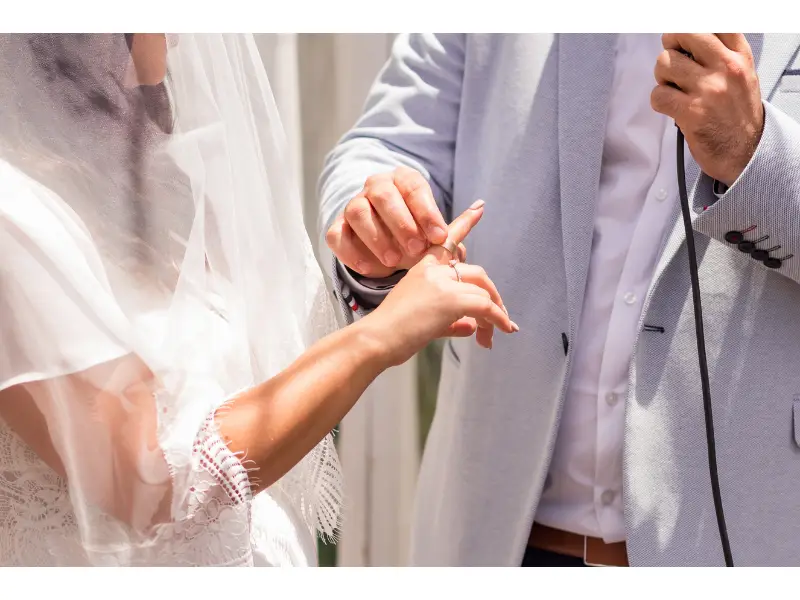
The Timeless Beauty of Jewish Destination Weddings: Traditions, Ceremonies, and Orthodox Considerations
Jewish weddings are deeply rooted in history and tradition, embodying the essence of cultural and religious identity. Opting for a destination wedding adds a unique charm to the ceremony, blending the sanctity of Jewish rituals with the beauty of exotic locales. This guide explores the quintessential ceremonies and rituals of a Jewish wedding, with a special focus on Orthodox Jewish weddings and their specific considerations.
The Ceremonies and Rituals
Ketubah Signing
This is the Jewish marriage contract, a binding document that outlines the husband’s responsibilities to his wife. The ketubah is signed before the wedding ceremony in the presence of two witnesses. In traditional and Orthodox circles, this is a males-only ceremony, but many modern interpretations include both partners, regardless of gender.
Bedeken (Veiling Ceremony)
The Bedeken involves the groom veiling the bride. This tradition is rooted in the Biblical story of Jacob, Leah, and Rachel, symbolizing the groom’s commitment to marry the bride for her inner beauty. In Orthodox weddings, this ceremony underscores the modesty and dignity of the bridal couple.
Chuppah (Wedding Canopy)
The Chuppah symbolizes the couple’s future home. It is a canopy under which the marriage ceremony is conducted, open on all sides to represent hospitality. The Chuppah ceremony is central to the Jewish wedding and is conducted outdoors in many Orthodox weddings, symbolizing the blessing of God.
Circling
In this ritual, the bride circles the groom seven times, representing the creation of a new family unit and the breaking down of barriers between them. In Orthodox tradition, the circling is seen as a protective act, symbolizing the bride’s creation of an invisible wall around her husband.
Exchange of Rings
In a Jewish wedding, the groom places a ring on the bride’s index finger, and recites a vow. The reciprocal exchange of rings, where the bride also places a ring on the groom’s finger, has become common in many Jewish weddings, though it is not traditionally part of Orthodox ceremonies.
Sheva Brachot (Seven Blessings)
Recited over a cup of wine, these blessings link the couple’s joy to the creation of the world and the hope for a future filled with peace and happiness. In Orthodox weddings, these blessings are a pivotal moment, drawing direct lines to Jewish heritage and the creation of a Jewish home.
Breaking the Glass
A well-known Jewish wedding ritual, the breaking of a glass by the groom is a reminder of the destruction of the Temple in Jerusalem. It’s a poignant moment that tempers joy with the remembrance of historical sorrow, significant in all branches of Judaism, including Orthodox.
Orthodox Jewish Wedding Considerations
Orthodox Jewish weddings adhere strictly to traditional laws and customs, with a few notable considerations:
-
- Segregation: Often, men and women are seated separately during the ceremony, and sometimes at the reception, in accordance with modesty laws.
-
- Fasting: The bride and groom may fast on their wedding day until the ceremony, mirroring the fast on Yom Kippur.
-
- Yichud: After the ceremony, the bride and groom spend a period in seclusion, a practice strictly observed in Orthodox weddings. This allows the couple a moment of private reflection and symbolizes their new status as a married couple.
Planning a Destination Wedding with Orthodox Considerations
When planning a Jewish destination wedding, especially an Orthodox one, it’s crucial to consider the location’s ability to accommodate specific religious requirements, such as kosher catering options, spaces for separate seating, and the availability of a mikveh. Consulting with a rabbi early in the planning process can ensure that all religious obligations are met, making your special day both memorable and meaningful.
Conclusion
A Jewish destination wedding is a beautiful way to celebrate love, blending ancient traditions with the beauty of the chosen locale. Understanding and incorporating the various ceremonies and rituals, especially within an Orthodox context, can seem daunting but ultimately enriches the wedding, making it a profoundly spiritual and joyous occasion. Whether in a historic European city, a Caribbean beach, or a scenic Israeli landscape, the essence of a Jewish wedding remains the same: a celebration of love, commitment, and Jewish heritage.
